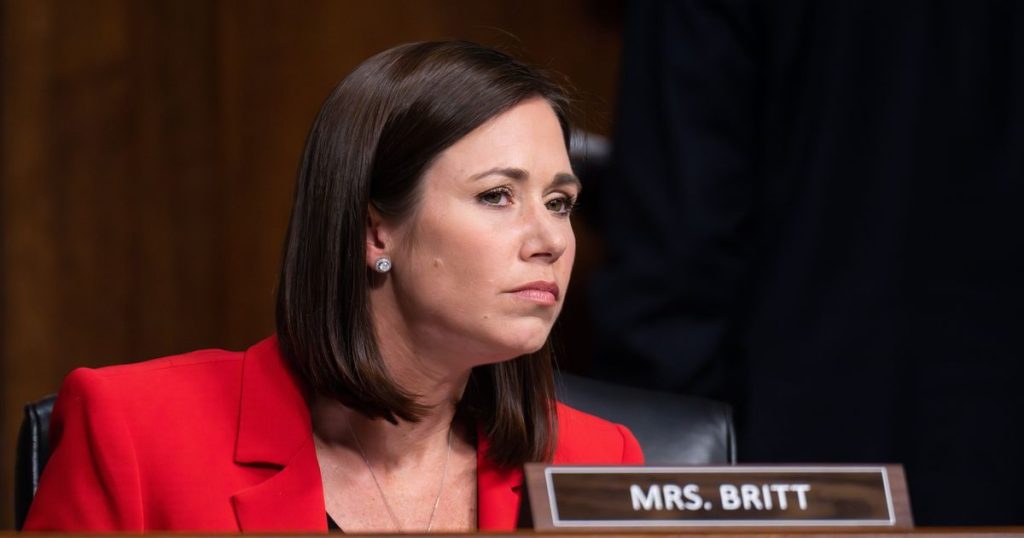The Trump administration has recently announced a significant cut to medical research funding, specifically targeting grants provided by the National Institutes of Health (NIH). This decision has sparked widespread criticism and concern, not only from the medical and scientific communities but also from some of the president’s strongest allies. On Friday night, the administration revealed plans to reduce federal research funding by $4 billion annually by limiting “indirect costs” associated with NIH grants. These costs, which are essential for maintaining research facilities and personnel, are now capped at 15% of direct costs for any given grant. While the administration argues that this move is necessary to eliminate waste and ensure taxpayer money is spent efficiently, critics insist that this drastic reduction will hinder groundbreaking research, lead to job losses, and undermine the ability of institutions to provide critical treatments.
Sen. Katie Britt (R-Ala.) addressed the issue during a recent exchange with an AL.com reporter, acknowledging the administration’s goal of fiscal responsibility but urging a more cautious approach. Britt emphasized that while it’s important to use taxpayer dollars judiciously, cutting funding for research could have severe consequences for institutions like the University of Alabama at Birmingham (UAB), which relies heavily on NIH grants. UAB’s health system is not only a leader in medical innovation but also a cornerstone of the regional economy, employing 28,000 people and serving as a vital source of healthcare in the area. Britt’s measured response reflects the concerns of many Republicans, particularly those representing states where major research centers play a critical role in both economic stability and public health.
The cuts are particularly concerning for rural areas, where academic health centers often serve as the primary providers of healthcare and employment. Institutions like the University of Iowa’s hospital system, which is also a major NIH recipient, are essential to their communities. These centers not only conduct life-saving research but also provide access to care for thousands of people who might otherwise go without. The reduction in funding could disproportionately affect these regions, leading to layoffs, reduced services, and a slower pace of medical progress. Critics argue that while some level of cost-cutting may be justified, the administration’s approach is overly broad and fails to account for the critical role these institutions play in their communities.
The administration’s rationale for the cuts—that research institutions have been wasting money on overhead—has been met with skepticism by medical researchers and business leaders. They argue that comparing NIH funding to private foundations is misplaced, as federal grants often cover essential infrastructure and personnel costs that private entities do not. Without these funds, institutions may struggle to maintain the facilities and staff necessary to conduct cutting-edge research. Additionally, legal experts have raised questions about the legitimacy of the cuts, with some arguing that the administration’s actions may violate federal law. Samuel Bagenstos, a law professor and former general counsel at the Department of Health and Human Services, has suggested that the cuts could face legal challenges, potentially leading to a halt by the courts.
As the news of the funding cuts spreads, opposition is growing from both sides of the aisle. While Britt’s concerns were relatively mild, they signal a broader unease among lawmakers, particularly those representing states with major research institutions. The economic and healthcare implications of these cuts could have far-reaching consequences, making it difficult for even the most loyal supporters of the administration to defend the move. With lawsuits likely on the horizon and growing political blowback, the Trump administration may find itself facing significant resistance to this policy change.
In summary, the Trump administration’s decision to slash NIH funding has sparked intense debate, with critics warning of severe repercussions for medical research, job markets, and healthcare access. While the administration frames the cuts as a necessary step toward fiscal responsibility, opponents argue that the move is shortsighted and could undermine the very institutions that drive innovation and provide critical services to their communities. As the situation unfolds, it remains to be seen whether the administration will revisit its decision or face increasing pressure from lawmakers, researchers, and the public alike.
